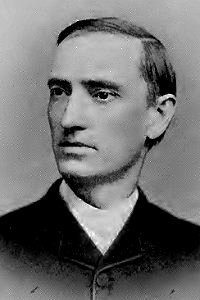The poet sings a mournful song,
Whose melancholy part
Has doubtless found an echo strong
In many a human heart;
But in the great Eternal Mind
Where first a soul was born,
No such stern fiat do I find
As Man was made to mourn.
When fresh from the Creative Hand,
He stood a lordly king,
To have and hold supreme command
O’er every living thing.
And Heav’n had given of its best
An Eden to adorn,
Man had not even there been blest,
Had he been made to mourn.
God looked upon the finished earth:
Behold, ’tis good,
He said;
Nor thorn nor thistle yet had birth,
Nor human tear been shed.
’Twas meant that man should live, not die,
And he had never worn
The stamp of immortality,
Had he been made to mourn.
’Twas not until a crafty foe,
With rank and poisonous breath,
Had entered paradise below
And sown the seeds of death;
’Twas not till man had disobeyed,
And sin its fruit had borne.
That paradise began to fade
And man began to mourn.
Alas! though Adam sinned and died,
The seed which then took root,
Has grown and scattered far and wide,
And borne its bitter fruit;
E’er since, life’s flowers of sweetest bloom
Have grown beside the thorn,
And from the cradle to the tomb,
Man ceases not to mourn.
Through Eden’s long continued gloom
This star of hope has gleamed:
When Shiloh shall again have come
And paradise redeemed,
When earth, as Heav’n, shall do His will,
Then Satan shall be shorn
Of all his potency for ill,
And man shall cease to mourn.
Till then, we’ll wait, endure and toil,
In sunshine or in showers,
Content to know that when we call
The promised help is ours;
Some day, beyond this lower land,
When earthly ties are torn,
We’ll see and better understand—
Man was not made to mourn.
